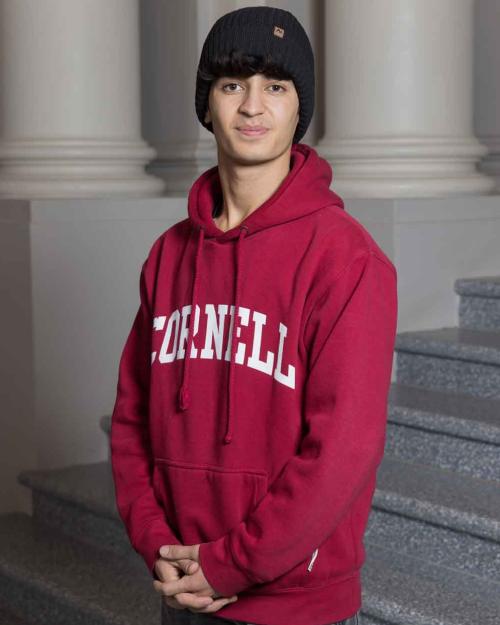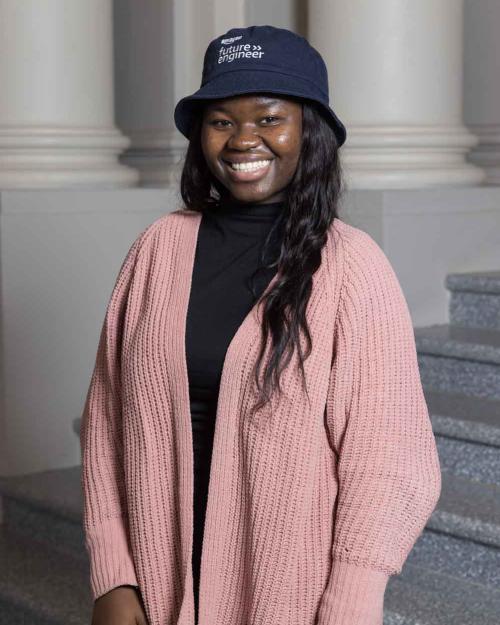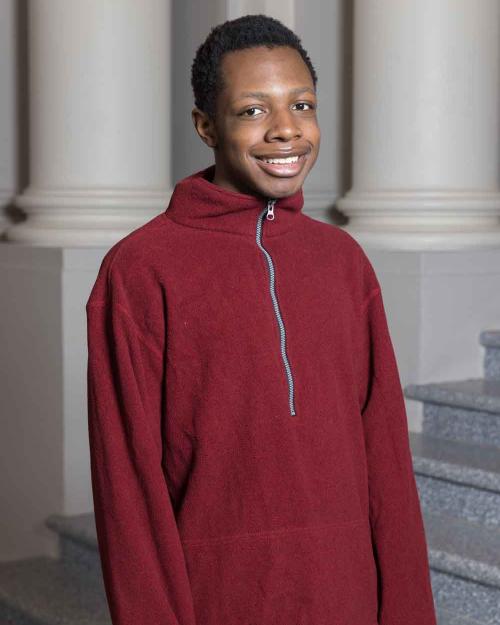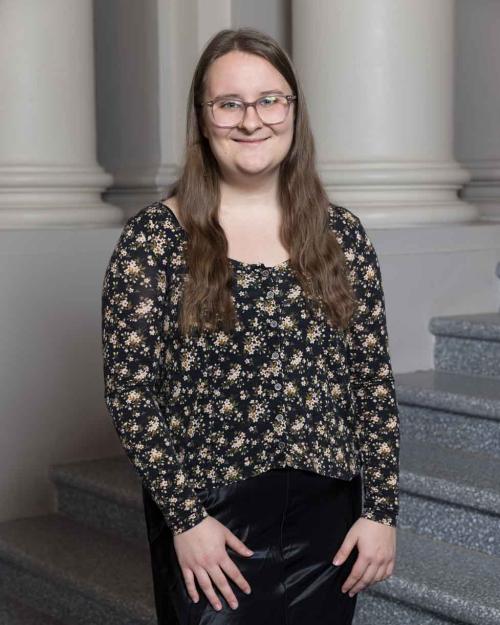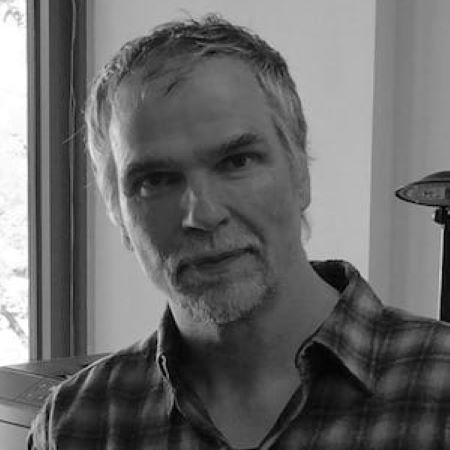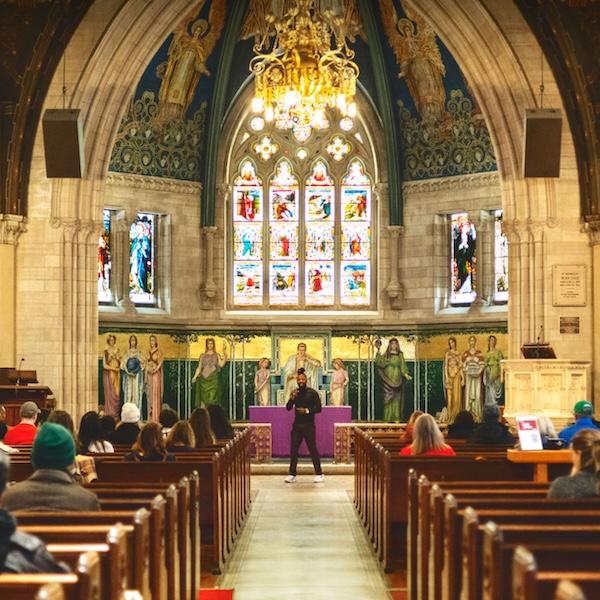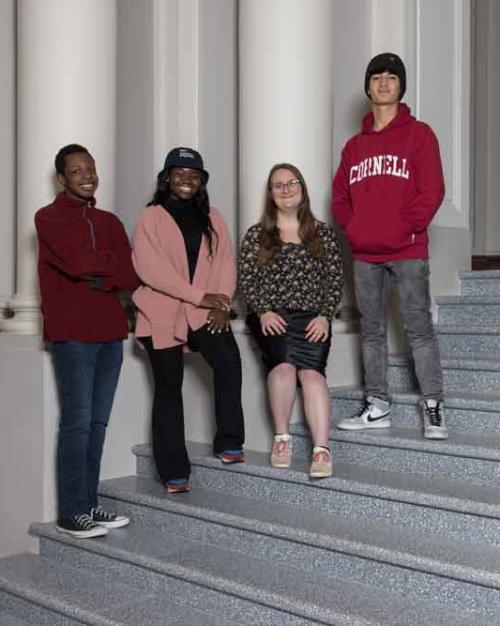For a first-year student, arriving on campus brings with it a mixture of emotions – excitement about challenging their intellect and meeting people from all over the world and nervousness about the exact same things.
Talk to first-year students at the end of their first semester and you’ll find they’ve figured out a lot of things – how to handle the rigor of their classes, how to manage their time and, most importantly, how to find the resources and people they need to support them on their journey. But they still have a lot of growing to do.
This fall semester seemed a bit more normal after two years of pandemic restrictions, but fallout from the pandemic — along with global and personal challenges — continues to impact students who are starting their Cornell studies.
“Students are having a hard time transitioning back into the classroom. They’re coming out from behind masks after such a long time, and learning how to interact with and learn from each other has proven to be emotionally and cognitively exhausting for some,” said Tracy Carrick, senior lecturer in the College of Arts & Sciences and director of the Writing Workshop in the John S. Knight Institute for Writing in the Disciplines. “The pandemic changed teaching and learning. Many high schools just weren’t able to provide the same instructional infrastructure, and so our challenge now is to figure out what is different and to work with diligence and patience to lift each other up.”
Michelle Smith, senior associate dean for undergraduate education in the College of Arts & Sciences, said the College has done a host of things to help students transition, including the ongoing first-year advising seminar.
“Welcoming students to campus and providing them with the opportunity to connect to faculty and each other is a joy,” she said. “We surveyed students at the end of the first-year advising seminar and over 85% of the students agreed with statements about their faculty advisor caring about them as a person and taking interest in their academic success. Nearly all students said they felt comfortable seeking help from their first-year faculty advisor.
“I am so appreciative of the faculty for helping students adjust and introducing them to additional opportunities such as the Nexus Scholars, Humanities Scholars, Harrison College Scholars, Career Development events, the Learning Strategies Center and the Math Support Center,” Smith said.
For the past five years, Carrick has been one of the faculty leading the first-year advising seminars. These once-a-week meetings, which include every first-year student in the College, introduce students to Cornell resources, connect them to faculty and allow them to have a safe space to talk about the challenges of their first semester.
“The seminar is about making a connection with an advisor, but I also want to make sure the students are able to start up a conversion with a peer,” Carrick said. “It helps them to build back those skills that atrophied a bit during the pandemic.”
‘Adjusting was a bit of a journey’
Hamid Rezaee ’26 was excited to start applying to U.S. colleges in 2021 with the help of the U.S. State Department’s EducationUSA, but then the government in his home country of Afghanistan collapsed, causing not only complete chaos for the country, but also shuttering his chances of taking the SATs, applying for a Visa or setting up travel.
He didn’t give up, though, and neither did his family. Rezaee took an English proficiency test, was admitted to Cornell, and he and his whole family traveled to Pakistan, where he was able to secure the papers needed to get to the U.S. Understandably, Rezaee was thrilled to finally land at the Syracuse airport this fall, and meet Cornell admissions staff at their hotel.
“Mr. Felton (Shawn Felton, the university’s executive director of undergraduate admissions) directed us every step of the way,” said Rezaee, who is one of eight first-year students this year from Afghanistan. “He was there to welcome us and greet us at our hotel.”
Despite lots of resources and guidance from Education USA about American culture, Rezaee said “adjusting was a bit of a journey.” He took part in Cornell’s Prepare program, the Office of Global Learning's pre-orientation program for international first-year and transfer undergraduates, which he said helped him to meet a lot of other international students. He’s also happy to have chosen to live in the Just About Music Program House – “my roommates have become very close friends. We engage in a lot of intellectual talk about everything from philosophy to physics.”
Rezaee plans to major in computer science and minor in entrepreneurship. He’s enjoyed his first-year writing seminar, entrepreneurship and CS classes, but he’s been challenged in math. “My high school didn’t offer a high-quality education – Calc I wasn’t even offered,” he said. “So, I’ll be sitting in my math class and the professor will be saying to us ‘Oh, you’ll remember this from high school.’ And I’m like, ‘No, I didn’t learn this in high school.’”
Luckily, he isn’t afraid to ask for help so he’s been to tutoring sessions, attended office hours with his professors and is still trying to find a study group to join.
His advising seminar introduced him to iconic Cornell landmarks, as well as academic resources. “My professor says don’t ever hesitate to ask for help because Cornell is dedicated to helping students,” he said.
While most of his time is spent studying, Rezaee also joined the International Student’s Union and the Cornell Outing Club, which took him on a three-day camping trip to the Adirondacks this fall. He also has a part-time job in the service center on North Campus, which allows him to send a little money to his parents. His mom, a teacher, and dad, who owns a construction supply business, both lost their jobs during the government and economic collapse.
As finals wrapped up, Rezaee said he was looking forward to winter break, not to relax, but to take some free online classes, read, gain more coding experience to help in his application to the Nexus Scholar Program and hopefully secure a new job as a student developer.
“I’ve found a lot of helpful resources and met some brilliant people,” he said.
‘Math and I are going to do great things’
In the span of the first semester, Richlove Nkansah ’26 has managed to form a solid group of friends, taken a full slate of classes and earned some leadership positions in clubs that are meaningful to her.
A computer science major, she’s part of Underrepresented Minorities in Computing, where she’s working to encourage other first-year students to consider careers in tech. She also spends one day a week mentoring a 10-year-old Dryden boy as part of YOURS (Youth Outreach Undergraduates Reshaping Success).
“We organize games and activities; it’s like a big sister/little brother program,” she said. “It makes me forget I have homework and a lot to do back here.”
Nkansah took part in Cornell’s Pre-Collegiate Summer Scholars Program, which she said helped her cement her group of fast friends.
“During the pandemic, people made friends online, so when we came back in person, a lot of people had lost the ability to keep a conversation going or to approach someone they don’t know,” she said. “I kept approaching people and that’s how I made friends here. It’s not completely back to normal; it’s a little hard to warm up to people.”
As a CS major, Nkansah said her classes have been challenging, but she was used to that from high school. She joins Rezaee in a bit of a love/hate relationship with math.
“I liked math in middle and high school, but by my senior year, wow,” she said. “But I’m keeping a positive outlook. Math and I are going to do great things.”
Her advising seminar has helped her feel more confident approaching professors about her grades or topics she doesn’t understand.
“You can tell that the professors really want to help you, even though they don’t have a lot of time. We think that professors are intimidating but it’s usually all in our heads.”
In a visit to her psychology professor, Nkansah learned a new study strategy that helped improve her grades.
She’s also appreciated her talks with a junior mentor she was paired with through the Office of Academic Diversity Initiatives (OADI), as well as a journal that she writes in as part of that mentorship.
“When you write things down, it helps you clear your mind,” she said. “You see things better when it’s on paper, rather than keeping it all in your mind and becoming overwhelmed.”
Some other nuggets of wisdom she’s learned:
- Don’t fall behind in assignments; they just keep coming.
- Don’t feel like you have to be your high school self. “Everyone is figuring it out, no one has it all together.”
- Learn to focus on one thing at a time and not try to multitask.
- Be gentle on yourself.
‘I was confident I could do my best here’
Making academics the top priority isn’t a challenge for Nic Oke ’26.
“In my family, education has always been emphasized as a way up, so I’ve always worked really hard in school,” said Oke, who grew up in Baltimore. “I already had the routine and resources and the mindset to stand up to the challenges of academic rigor, so I was pretty confident I could do my best here.”
Oke is exploring a host of possible majors, including sociology and philosophy, as he has an interest in attending law school and working to improve the criminal justice system.
“Over the past few years, I’ve been transformed and heavily shaped by the ongoing conversations in our country about injustice, especially in the context of the legal system,” he said. “I want to get involved somehow.”
He’s already joined two clubs related to criminal justice reform and will working as a research assistant to Sadé Lindsay, assistant research professor in the Cornell Jeb E. Brooks School of Public Policy, in the spring.
“It’s been interesting to discover the number and depth of opportunities available to students for research,” he said. “I truly enjoy the emphasis on work outside of the classroom.”
Before he got to campus, Oke was fearful about whether he’d be able to have the same close contact with his teachers as he did in high school.
“A lot of Cornell professors recognize that larger lectures made it harder to feel connected, so they are willing to reach out to students in very direct ways,” he said, adding that his Introduction to Sociology professor, Kendra Bischoff, went out of her way to greet him, making him feel more comfortable coming to her with questions. “My professors have made it clear that just because I’m asking for help, it doesn’t mean that I’m not intelligent or worth appreciating. I’ve always felt very affirmed.”
The social transition has been a bit more tricky for Oke because he has a social anxiety disorder that makes it tough to engage with other students.
“I thought I would have a stronger group of friends that would form quickly,” he said. “I haven’t necessarily found my people or my community yet, but I haven’t lost hope. A lot of upperclassmen have told me that often comes later, that a lot of students are still finding who are they are and who they want to be.”
‘It already feels like a home away from home’
Kira Pawletko ’26 didn’t have an easy childhood, dealing with her mom’s mental illness and several moves. But she made a decision in fifth grade – spurred in part by her mom telling her she’d never go to college – to focus on academics and get into the best college she could. Then came the COVID-19 pandemic, which was extra stressful for her because her dad was medically vulnerable, meaning she was stuck learning at home longer than her peers. She says all of these experiences have just made her extra motivated to succeed, and to help other kids who find themselves in similar situations.
With interests in cognitive science, linguistics, Spanish and education (among other things), Pawletko is taking a wide range of classes to determine exactly where she’ll focus her academic interests.
“It’s been a great experience coming to Cornell,” she said. “Any anxiety I had about going to college wasn’t there after three weeks. It already feels like a home away from home.”
Part of that “home away from home” feeling comes from Pawletko’s friend group, which is as dedicated to academics as she is. “ It’s been surprisingly easy to find people who care as much about academics as I do,” she said. “I’ve met so many people who want to be social but not to go out and party.
"There are so many people who care about the world around them, who want to make a difference.”
On any typical weekday evening, Pawletko finds herself in her suite with 3-4 other friends, all with headphones on and deeply involved in their work, but together in the same space.
“I love the girls in my suite. I’ve been up with them until 3 a.m. more times than I can count. We emotionally support each other.”
Another source of support has been her advising dean and her professors, who helped her figure out her research plan and her schedule.
Pawletko considers herself lucky that one of her first-semester classes was Linguistics 1101 taught by Laura Casasanto, a visiting lecturer in linguistics. Casasanto and her husband, Daniel Casasanto, operate the Experience and Cognition Lab and were able to add Pawletko to their undergraduate lab group.
“’I’m studying whether signers of American Sign Language process emotions differently than non-signers,” she said, because facial expressions carry so much meaning to signers.
She’s also a part of the Cornell University Wind Symphony, where she’s “challenged as much musically as I am academically. There are so many people with so much skill. I try my best to keep up.”
One of her biggest challenges has been navigating campus dining with some severe food allergies. Dining staff at Northstar prepare all of her meals separately and she darts back to North Campus to grab her lunch every day.
“Managing my allergies has been the equivalent of a class,” she said. “But the team here has been fantastic.”
She’s looking forward to a little rest over winter break, although she does plan to spend some time studying for a chemistry placement exam so she can test into a higher level course next semester.
“I am looking forward to resting, relaxing and spending time with my friends and family,” she said. “And to catching up on sleep.”

